Overview
- Brief Narrative
- Cloth yarmulke, likely used during World War II, belonging to Milton Emont, a Jewish American World War II veteran. Milton was born to Polish parents in Paterson, New Jersey. He showed an aptitude for languages at a young age, and earned his Bachelor’s degree in French and Spanish. Milton registered for the draft in 1942, and entered active service on March 5, 1943. In the Army, Milton served 22 months in the 3189th Signal Service Battalion. As a translator and teletype operator, he was responsible for sending and receiving messages in Section Headquarters located in both France and Germany. In 1945, while in France, he was able to complete eight weeks of graduate coursework in French and French literature. After the war, he returned briefly to the United States and was discharged from the army on April 16, 1946. He then traveled back to France to spend a year as a teletype operator for Trans World Airline Company (TWA), returning to the United States on June 21, 1947. He obtained a Master’s degree from Middlebury College in 1948, and began his doctorate work at the University of Wisconsin in 1949. While there, Milton met Marietta Gruenbaum, a Jewish immigrant who had spent two and a half years in Theresienstadt ghetto-labor camp in German-occupied Czechoslovakia. Marietta completed her bachelor’s and master’s degrees on a Hillel scholarship. She met Milton during her final semester, and the two began seeing each other on group dates. After three months, when Marietta’s visa was due to expire, Milton proposed. The couple married in January 1950.
- Date
-
use:
approximately 1943-approximately 1946
- Geography
-
use:
Europe.
- Credit Line
- United States Holocaust Memorial Museum Collection, Gift of Carl Emont
- Contributor
-
Subject:
Milton Emont
- Biography
-
Milton Emont (1923-2018) was born in Paterson, New Jersey, to George and Rose Emont, both of whom were born in Poland. He had three siblings, Harold, Natalie, and Gordon (1928-2002). George worked in a silk mill into the 1930s, and after the silk mill went out of business, he opened his own store in Jersey City. Milton and his brothers all worked in the store. The family attended a synagogue with a traveling rabbi, and Milton’s aptitude for languages, including Hebrew, enabled him to step in for the rabbi and run services from the age of 13.
Milton graduated from high school two years early. After high school, Milton’s skill with languages led him to attend Montclair State College, where he focused on language instruction. He registered for the draft in 1942, and entered active service on March 5, 1943. After completing his bachelor’s degree in 1943, Milton moved to Texas for a month of basic training, and was then sent to the University of Cincinnati for an eight-month Army language-training course.
In the Army, Milton served 22 months in the 3189th Signal Service Battalion. As a translator and teletype operator, he was responsible for sending and receiving messages in Section Headquarters located in both France and Germany. In 1945, he was able to complete eight weeks of graduate coursework in French and French literature at the Sorbonne and Institute of Phonetique, in France. After the war, he returned briefly to the United States and was discharged from the Army on April 16, 1946. He then traveled back to France, and spent another year working in telegraph airline communications for Trans World Airline Company (TWA) at Orly Field in Paris.
Milton returned to the United States on June 21, 1947, and began working at Veterans Evening High School in Jersey City. He obtained a Master’s degree from Middlebury College in 1948 and began his doctorate work at the University of Wisconsin in 1949. While there, Milton met Marietta Gruenbaum, a Jewish immigrant who had spent two and a half years in Theresienstadt ghetto-labor camp in German-occupied Czechoslovakia. Marietta completed her bachelor’s and master’s degrees on a Hillel scholarship. She met Milton during her final semester, and the two began seeing each other on group dates. After three months, when Marietta’s visa was due to expire, Milton proposed. The couple married in January 1950 and Milton completed his postgraduate work as a Fulbright Scholar at University Grenoble in 1952. The couple moved to Granville, Ohio, where they both began teaching at Denison University in 1954. Milton completed his doctorate in 1958, and returned to Paris several times for research. Milton and Marietta had two children.
Physical Details
- Classification
-
Jewish Art and Symbolism
- Category
-
Jewish ceremonial objects
- Object Type
-
Yarmulkes (lcsh)
- Genre/Form
- Religious articles.
- Physical Description
- Black textile skullcap made from six, triangualr cloth pieces sewn together into a dome with a button where the points join together at the top. The interior in lined.
- Dimensions
- overall: Height: 4.500 inches (11.43 cm) | Diameter: 6.750 inches (17.145 cm)
- Materials
- overall : cloth, thread
Rights & Restrictions
- Conditions on Access
- No restrictions on access
- Conditions on Use
- No restrictions on use
Keywords & Subjects
Administrative Notes
- Legal Status
- Permanent Collection
- Provenance
- The yarmulke was donated to the United States Holocaust Memorial Museum in 2018 by Carl Emont, the son of Milton and Marietta Gruenbaum Emont.
- Record last modified:
- 2023-08-25 17:41:06
- This page:
- https://collections.ushmm.org/search/catalog/irn652767
Download & Licensing
In-Person Research
- By Appointment
- Request 21 Days in Advance of Visit
- Plan a Research Visit
- Request to See This Object
Contact Us
Also in Marietta Gruenbaum collection
The collection consists of Judaica, scrip, correspondence, ephemera, papers, and photographs relating to the experiences of Mariette Gruenbaum and Milton Emont in Czechoslovakia, England, the United States, and France before, during, and after the Holocaust.
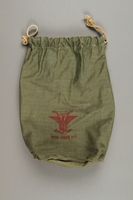
US Army pouch for a shoe shine kit issued to Milton Emont
Object
United States Army pouch for a shoe shine kit, issued to Milton Emont, a Jewish American World War II veteran. Milton was born to Polish parents in Paterson, New Jersey. He showed an aptitude for languages at a young age, and earned his Bachelor’s degree in French and Spanish. Milton registered for the draft in 1942, and entered active service on March 5, 1943. In the Army, Milton served 22 months in the 3189th Signal Service Battalion. As a translator and teletype operator, he was responsible for sending and receiving messages in Section Headquarters located in both France and Germany. In 1945, while in France, he was able to complete eight weeks of graduate coursework in French and French literature. After the war, he returned briefly to the United States and was discharged from the army on April 16, 1946. He then traveled back to France to spend a year as a teletype operator for Trans World Airline Company (TWA), returning to the United States on June 21, 1947. He obtained a Master’s degree from Middlebury College in 1948, and began his doctorate work at the University of Wisconsin in 1949. While there, Milton met Marietta Gruenbaum, a Jewish immigrant who had spent two and a half years in Theresienstadt ghetto-labor camp in German-occupied Czechoslovakia. Marietta completed her bachelor’s and master’s degrees on a Hillel scholarship. She met Milton during her final semester, and the two began seeing each other on group dates. After three months, when Marietta’s visa was due to expire, Milton proposed. The couple married in January 1950.
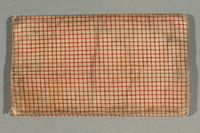
Multi-colored, cloth document cover used by Marietta Gruenbaum
Object
Cloth document cover, used by Marietta Gruenbaum, a Jewish-Czechoslovakian girl who was held in Theresienstadt ghetto-labor camp. Before Czechoslovakia was occupied by Germany in 1939, Marietta lived in Prague with her parents, Margarete and Karel, and her brother, Michael. In October 1941, Karel was arrested by the Gestapo and detained in Pankrác prison in Prague. On December 3, Karel was sent to Theresienstadt, where he was killed on the 18th in the Small Fortress. On November 20, 1942, Margarete, Michael, and Marietta were sent to the ghetto-labor camp aboard transport Cc. Marietta worked in the camp laundry. When the family received orders for deportation to Auschwitz killing center in German-occupied Poland in the fall of 1944, Margarete leveraged her job in the art studio to remove her family from the transport list. They were liberated from Theresienstadt on May 8, 1945, by the Soviet Army, and returned to Prague. In 1946, Marietta traveled to London for nine months before receiving a scholarship to attend the University of Wisconsin in the United States. During her final semester, she met Milton Emont, a Ph.D. student who had served in the U.S. Army. The couple began seeing each other on group dates. After three months, when Marietta’s visa was due to expire, Milton proposed. They married in January 1950.
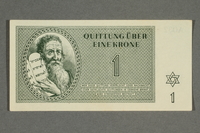
Theresienstadt ghetto-labor camp scrip, 1 krone note, acquired by Marietta Gruenbaum
Object
Scrip, valued at 1 krone, acquired by Marietta Gruenbaum, a Jewish-Czechoslovakian girl who was held in Theresienstadt ghetto-labor camp. Currency was confiscated from inmates and replaced with scrip, which could only be used in the camp. The scrip was part of an elaborate illusion to make the camp seem normal and appear as though workers were being paid for their labor, but the money had no real monetary value. Before Czechoslovakia was occupied by Germany in 1939, Marietta lived in Prague with her parents, Karel and Margarete, and her brother, Michael. In October 1941, Karel was arrested by the Gestapo and detained in Pankrác prison in Prague. On December 3, Karel was sent to Theresienstadt, where he was killed on the 18th in the Small Fortress. On November 20, 1942, Margarete, Michael, and Marietta were sent to the ghetto-labor camp aboard transport Cc. Marietta worked in the camp laundry. When the family received orders for deportation to Auschwitz killing center in German-occupied Poland in the fall of 1944, Margarete leveraged her job in the art studio to remove her family from the transport list. They were liberated from Theresienstadt on May 8, 1945, by the Soviet Army, and returned to Prague. In 1946, Marietta traveled to London for nine months before receiving a scholarship to attend the University of Wisconsin in the United States. During her final semester, she met Milton Emont, a Ph.D. student who had served in the U.S. Army. The couple began seeing each other on group dates. After three months, when Marietta’s visa was due to expire, Milton proposed. They married in January 1950.
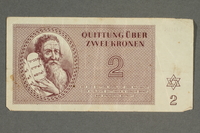
Theresienstadt ghetto-labor camp scrip, 2 kronen note, acquired by Marietta Gruenbaum
Object
Scrip, valued at 2 kronen, acquired by Marietta Gruenbaum, a Jewish-Czechoslovakian girl who was held in Theresienstadt ghetto-labor camp. Currency was confiscated from inmates and replaced with scrip, which could only be used in the camp. The scrip was part of an elaborate illusion to make the camp seem normal and appear as though workers were being paid for their labor, but the money had no real monetary value. Before Czechoslovakia was occupied by Germany in 1939, Marietta lived in Prague with her parents, Karel and Margarete, and her brother, Michael. In October 1941, Karel was arrested by the Gestapo and detained in Pankrác prison in Prague. On December 3, Karel was sent to Theresienstadt, where he was killed on the 18th in the Small Fortress. On November 20, 1942, Margarete, Michael, and Marietta were sent to the ghetto-labor camp aboard transport Cc. Marietta worked in the camp laundry. When the family received orders for deportation to Auschwitz killing center in German-occupied Poland in the fall of 1944, Margarete leveraged her job in the art studio to remove her family from the transport list. They were liberated from Theresienstadt on May 8, 1945, by the Soviet Army, and returned to Prague. In 1946, Marietta traveled to London for nine months before receiving a scholarship to attend the University of Wisconsin in the United States. During her final semester, she met Milton Emont, a Ph.D. student who had served in the U.S. Army. The couple began seeing each other on group dates. After three months, when Marietta’s visa was due to expire, Milton proposed. They married in January 1950.
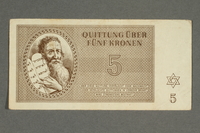
Theresienstadt ghetto-labor camp scrip, 5 kronen note, acquired by Marietta Gruenbaum
Object
Scrip, valued at 5 kronen, acquired by Marietta Gruenbaum, a Jewish-Czechoslovakian girl who was held in Theresienstadt ghetto-labor camp. Currency was confiscated from inmates and replaced with scrip, which could only be used in the camp. The scrip was part of an elaborate illusion to make the camp seem normal and appear as though workers were being paid for their labor, but the money had no real monetary value. Before Czechoslovakia was occupied by Germany in 1939, Marietta lived in Prague with her parents, Karel and Margarete, and her brother, Michael. In October 1941, Karel was arrested by the Gestapo and detained in Pankrác prison in Prague. On December 3, Karel was sent to Theresienstadt, where he was killed on the 18th in the Small Fortress. On November 20, 1942, Margarete, Michael, and Marietta were sent to the ghetto-labor camp aboard transport Cc. Marietta worked in the camp laundry. When the family received orders for deportation to Auschwitz killing center in German-occupied Poland in the fall of 1944, Margarete leveraged her job in the art studio to remove her family from the transport list. They were liberated from Theresienstadt on May 8, 1945, by the Soviet Army, and returned to Prague. In 1946, Marietta traveled to London for nine months before receiving a scholarship to attend the University of Wisconsin in the United States. During her final semester, she met Milton Emont, a Ph.D. student who had served in the U.S. Army. The couple began seeing each other on group dates. After three months, when Marietta’s visa was due to expire, Milton proposed. They married in January 1950.
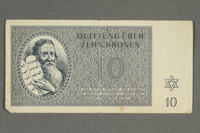
Theresienstadt ghetto-labor camp scrip, 10 kronen note, acquired by Marietta Gruenbaum
Object
Scrip, valued at 10 kronen, acquired by Marietta Gruenbaum, a Jewish-Czechoslovakian girl who was held in Theresienstadt ghetto-labor camp. Currency was confiscated from inmates and replaced with scrip, which could only be used in the camp. The scrip was part of an elaborate illusion to make the camp seem normal and appear as though workers were being paid for their labor, but the money had no real monetary value. Before Czechoslovakia was occupied by Germany in 1939, Marietta lived in Prague with her parents, Karel and Margarete, and her brother, Michael. In October 1941, Karel was arrested by the Gestapo and detained in Pankrác prison in Prague. On December 3, Karel was sent to Theresienstadt, where he was killed on the 18th in the Small Fortress. On November 20, 1942, Margarete, Michael, and Marietta were sent to the ghetto-labor camp aboard transport Cc. Marietta worked in the camp laundry. When the family received orders for deportation to Auschwitz killing center in German-occupied Poland in the fall of 1944, Margarete leveraged her job in the art studio to remove her family from the transport list. They were liberated from Theresienstadt on May 8, 1945, by the Soviet Army, and returned to Prague. In 1946, Marietta traveled to London for nine months before receiving a scholarship to attend the University of Wisconsin in the United States. During her final semester, she met Milton Emont, a Ph.D. student who had served in the U.S. Army. The couple began seeing each other on group dates. After three months, when Marietta’s visa was due to expire, Milton proposed. They married in January 1950.
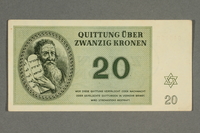
Theresienstadt ghetto-labor camp scrip, 20 kronen note, acquired by Marietta Gruenbaum
Object
Scrip, valued at 20 kronen, acquired by Marietta Gruenbaum, a Jewish-Czechoslovakian girl who was held in Theresienstadt ghetto-labor camp. Currency was confiscated from inmates and replaced with scrip, which could only be used in the camp. The scrip was part of an elaborate illusion to make the camp seem normal and appear as though workers were being paid for their labor, but the money had no real monetary value. Before Czechoslovakia was occupied by Germany in 1939, Marietta lived in Prague with her parents, Karel and Margarete, and her brother, Michael. In October 1941, Karel was arrested by the Gestapo and detained in Pankrác prison in Prague. On December 3, Karel was sent to Theresienstadt, where he was killed on the 18th in the Small Fortress. On November 20, 1942, Margarete, Michael, and Marietta were sent to the ghetto-labor camp aboard transport Cc. Marietta worked in the camp laundry. When the family received orders for deportation to Auschwitz killing center in German-occupied Poland in the fall of 1944, Margarete leveraged her job in the art studio to remove her family from the transport list. They were liberated from Theresienstadt on May 8, 1945, by the Soviet Army, and returned to Prague. In 1946, Marietta traveled to London for nine months before receiving a scholarship to attend the University of Wisconsin in the United States. During her final semester, she met Milton Emont, a Ph.D. student who had served in the U.S. Army. The couple began seeing each other on group dates. After three months, when Marietta’s visa was due to expire, Milton proposed. They married in January 1950.
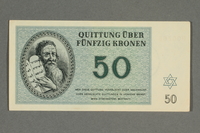
Theresienstadt ghetto-labor camp scrip, 50 kronen note, acquired by Marietta Gruenbaum
Object
Scrip, valued at 50 kronen, acquired by Marietta Gruenbaum, a Jewish-Czechoslovakian girl who was held in Theresienstadt ghetto-labor camp. Currency was confiscated from inmates and replaced with scrip, which could only be used in the camp. The scrip was part of an elaborate illusion to make the camp seem normal and appear as though workers were being paid for their labor, but the money had no real monetary value. Before Czechoslovakia was occupied by Germany in 1939, Marietta lived in Prague with her parents, Karel and Margarete, and her brother, Michael. In October 1941, Karel was arrested by the Gestapo and detained in Pankrác prison in Prague. On December 3, Karel was sent to Theresienstadt, where he was killed on the 18th in the Small Fortress. On November 20, 1942, Margarete, Michael, and Marietta were sent to the ghetto-labor camp aboard transport Cc. Marietta worked in the camp laundry. When the family received orders for deportation to Auschwitz killing center in German-occupied Poland in the fall of 1944, Margarete leveraged her job in the art studio to remove her family from the transport list. They were liberated from Theresienstadt on May 8, 1945, by the Soviet Army, and returned to Prague. In 1946, Marietta traveled to London for nine months before receiving a scholarship to attend the University of Wisconsin in the United States. During her final semester, she met Milton Emont, a Ph.D. student who had served in the U.S. Army. The couple began seeing each other on group dates. After three months, when Marietta’s visa was due to expire, Milton proposed. They married in January 1950.
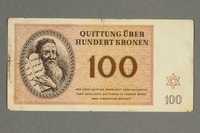
Theresienstadt ghetto-labor camp scrip, 100 kronen note, acquired by Marietta Gruenbaum
Object
Scrip, valued at 100 kronen, acquired by Marietta Gruenbaum, a Jewish-Czechoslovakian girl who was held in Theresienstadt ghetto-labor camp. Currency was confiscated from inmates and replaced with scrip, which could only be used in the camp. The scrip was part of an elaborate illusion to make the camp seem normal and appear as though workers were being paid for their labor, but the money had no real monetary value. Before Czechoslovakia was occupied by Germany in 1939, Marietta lived in Prague with her parents, Karel and Margarete, and her brother, Michael. In October 1941, Karel was arrested by the Gestapo and detained in Pankrác prison in Prague. On December 3, Karel was sent to Theresienstadt, where he was killed on the 18th in the Small Fortress. On November 20, 1942, Margarete, Michael, and Marietta were sent to the ghetto-labor camp aboard transport Cc. Marietta worked in the camp laundry. When the family received orders for deportation to Auschwitz killing center in German-occupied Poland in the fall of 1944, Margarete leveraged her job in the art studio to remove her family from the transport list. They were liberated from Theresienstadt on May 8, 1945, by the Soviet Army, and returned to Prague. In 1946, Marietta traveled to London for nine months before receiving a scholarship to attend the University of Wisconsin in the United States. During her final semester, she met Milton Emont, a Ph.D. student who had served in the U.S. Army. The couple began seeing each other on group dates. After three months, when Marietta’s visa was due to expire, Milton proposed. They married in January 1950.
Marietta Gruenbaum papers
Document
Contains documents, correspondence, ephemera (including ration cards, menus, pamphlets, clippings, magazines), photos (both personal and commercial photo packages), and US government-issued Jewish religious items documenting the experiences of Mariette Gruenbaum, a survivor of Theresienstadt. Documents her life in Czechoslovakia, England, immigration to the United States, and travels to France.
Guide to France owned by Milton Emont
Object
English-language guide to France, likely used during World War II, by Milton Emont, a Jewish American World War II veteran. The guide was published in 1944 by Librairie Hachette. Milton was born to Polish parents in Paterson, New Jersey. He showed an aptitude for languages at a young age, and earned his Bachelor’s degree in French and Spanish. Milton registered for the draft in 1942, and entered active service on March 5, 1943. In the Army, Milton served 22 months in the 3189th Signal Service Battalion. As a translator and teletype operator, he was responsible for sending and receiving messages in Section Headquarters located in both France and Germany. In 1945, while in France, he was able to complete eight weeks of graduate coursework in French and French literature. After the war, he returned briefly to the United States and was discharged from the army on April 16, 1946. He then traveled back to France to spend a year as a teletype operator for Trans World Airline Company (TWA), returning to the United States on June 21, 1947. He obtained a Master’s degree from Middlebury College in 1948, and began his doctorate work at the University of Wisconsin in 1949. While there, Milton met Marietta Gruenbaum, a Jewish immigrant who had spent two and a half years in Theresienstadt ghetto-labor camp in German-occupied Czechoslovakia. Marietta completed her bachelor’s and master’s degrees on a Hillel scholarship. She met Milton during her final semester, and the two began seeing each other on group dates. After three months, when Marietta’s visa was due to expire, Milton proposed. The couple married in January 1950.
Soldiers guide to Switzerland owned by Milton Emont
Object
English-language, soldiers guide to Switzerland owned by Milton Emont, a Jewish American World War II veteran. The guide was published in 1946 and intended for use by Americian soldiers. It was presented by the Swiss tradesmen as a souvenir of leave time spent in Switzerland. Milton was born to Polish parents in Paterson, New Jersey. He showed an aptitude for languages at a young age, and earned his Bachelor’s degree in French and Spanish. Milton registered for the draft in 1942, and entered active service on March 5, 1943. In the Army, Milton served 22 months in the 3189th Signal Service Battalion. As a translator and teletype operator, he was responsible for sending and receiving messages in Section Headquarters located in both France and Germany. In 1945, while in France, he was able to complete eight weeks of graduate coursework in French and French literature. After the war, he returned briefly to the United States and was discharged from the army on April 16, 1946. He then traveled back to France to spend a year as a teletype operator for Trans World Airline Company (TWA), returning to the United States on June 21, 1947. He obtained a Master’s degree from Middlebury College in 1948, and began his doctorate work at the University of Wisconsin in 1949. While there, Milton met Marietta Gruenbaum, a Jewish immigrant who had spent two and a half years in Theresienstadt ghetto-labor camp in German-occupied Czechoslovakia. Marietta completed her bachelor’s and master’s degrees on a Hillel scholarship. She met Milton during her final semester, and the two began seeing each other on group dates. After three months, when Marietta’s visa was due to expire, Milton proposed. The couple married in January 1950.
English and French booklet for baccalaureate candidates owned by Milton Emont
Object
French and English booklet owned by Milton Emont, a Jewish American World War II veteran. The booklet was written by R. Lamar and A. Pruvot, and published in 1951, in France, by Librairie Hachette. Milton was born to Polish parents in Paterson, New Jersey. He showed an aptitude for languages at a young age, and earned his Bachelor’s degree in French and Spanish. Milton registered for the draft in 1942, and entered active service on March 5, 1943. In the Army, Milton served 22 months in the 3189th Signal Service Battalion. As a translator and teletype operator, he was responsible for sending and receiving messages in Section Headquarters located in both France and Germany. In 1945, while in France, he was able to complete eight weeks of graduate coursework in French and French literature. After the war, he returned briefly to the United States and was discharged from the army on April 16, 1946. He then traveled back to France to spend a year as a teletype operator for Trans World Airline Company (TWA), returning to the United States on June 21, 1947. He obtained a Master’s degree from Middlebury College in 1948, and began his doctorate work at the University of Wisconsin in 1949. While there, Milton met Marietta Gruenbaum, a Jewish immigrant who had spent two and a half years in Theresienstadt ghetto-labor camp in German-occupied Czechoslovakia. Marietta completed her bachelor’s and master’s degrees on a Hillel scholarship. She met Milton during her final semester, and the two began seeing each other on group dates. After three months, when Marietta’s visa was due to expire, Milton proposed. The couple married in January 1950.



